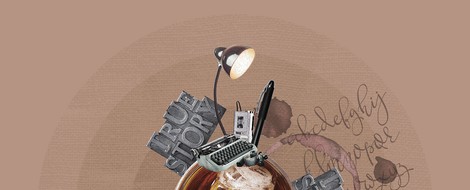sharing is caring
ist wirklich so!
Vielen Dank fürs Teilen!
Kluge Köpfe filtern für dich relevante Beiträge aus dem Netz.
Entdecke handverlesene Artikel, Videos und Audios zu deinen Themen.

Kurator'in für: Kopf und Körper Fundstücke
Geboren 1984 in Zwickau, Studium der Politikwissenschaft, Geschichte und Germanistik in Jena und Perugia. Volontariat bei der Tageszeitung Freie Presse, anschließend zweieinhalb Jahre als Redakteur in Zwickau. Lebt als freier Autor in Leipzig und Bukarest. Quoten-Ossi bei Krautreporter.
Der ukrainische Schriftsteller Volodymyr Rafejenko wurde 1969 in Donezk geboren und lebte dort als Schriftsteller und Professor für russische Philologie bis 2014, als die vom Kreml unterstützten Separatisten den Krieg in den Donbas brachten. Er floh in ein Dorf außerhalb von Kyiv und hat seitdem einen Roman auf Russisch über die groteske Absurdität des Krieges, The Length of Days (übersetzt von Sibelan Forrester ins Englische) und einen Roman auf Ukrainisch, Mondegreen (übersetzt von Mark Andryczyk ins Englische) über Sprache, Vertreibung und das Flüchtlingsdasein im eigenen Land geschrieben. Einen Tag nach Beginn der Invasion am 24. Februar befand sich Rafejenko plötzlich wieder in besetztem Gebiet, Freunde aus benachbarten Orten schickten ihm Nachrichten über Gräueltaten russischer Soldaten. Rafejenko begann Tagebuch zu schreiben – und eine Korrespondenz mit Marci Shore, einer Professorin für Geschichte an der Uni Yale.
Project Syndicate hat eine gekürzte Version dieses faszinierenden Gesprächs veröffentlicht, in dem es um Wahrnehmung und Wahrheit im Krieg geht beziehungsweise wie der Krieg verändert, was Wahrheit ist und wie Wahrnehmung funktioniert. Ein kurzer Ausschnitt aus einem Gespräch zwischen zwei großen Kennern der osteuropäischen Literatur, das nicht nur wegen seiner Aktualität (teilweise geführt während Artilleriebeschuss) so relevant ist, sondern weil es auch ein aufrüttelndes Gespräch über die Funktion von Literatur und Philosophie ist:
VR: Very often people are unable to grasp that it is not the intention, which can be good, which gives meaning to our actions. Actions acquire their true meaning only in the world of Others. For that reason it is said in one good book: “You shall know them by their deeds.”
MS: Can truth save us?
VR: I’m certain that a person’s very effort to remain in the realm of truth is salvation being realized.
MS: How can we understand what this realm of truth is?
VR: Truth is never given in a pre-prepared form. Truth, as Marcel Proust said, cannot be received by post. Truth can only be embodied by us, by ourselves, by our own exertions on the border of our empirical life and its metaphysics. We – meaning we human beings – must recognize the fact of co-creation. Truth desires that we be its creators. This is its summons to us.
MS: Proust was right. For the Czech philosopher Jan Patočka, truth was something that had to be constantly sought, even though, as you say, it is never there as an object to be taken in a pre-made form. But that doesn’t mean that there is no such thing as truth and that we can give up on it. What Patočka and other East European dissident philosophers did was to insist that subjectivity does not relativize truth, but grounds it. That we are co-creators of truth makes our responsibility not lesser, but greater.
VR: Truth is not a “what.” Truth is a “who.” It is born each time at the moment of our endeavor, consummating itself on the border of our subjectivity and the thing-in-itself. It is never yesterday, never tomorrow. It is always now, at this moment. And each time it must be re-created by us anew. And each time, we, together with it, create ourselves anew.
MS: I’m thinking about Chekhov’s zoologist in The Duel, who says to the much younger Russian Orthodox deacon, a fellow boarder in a village on the Black Sea: “You are so corrupted by your seminary philosophy that you want to see nothing but fog in everything. The abstract studies with which your youthful head is stuffed are called abstract just because they abstract your minds from what is obvious. Look the devil straight in the eye, and if he’s the devil, tell him he’s the devil, and don’t go calling to Kant or Hegel for explanations.”
VR: Chekhov’s zoologist always lies. Just like the philologist. In the story, Von Koren and Laevsky [the zoologist and the minor bureaucrat-philologist who has run off to the seaside town with his mistress, respectively – ed.] express a very Chekhovian problem, one that haunted all his work: faith without deeds, and deeds without faith. Von Koren, of course, is deeds without faith, deeds driven by cynical, egotistical impulses, with disdain for the world of values. Laevsky is faith without deeds: starry-eyed idealism, erudition, spiritual attachment to all that is elevated – literature, philosophy, art – yet an attachment that in the end offers only empty, deceiving rhetoric under the guise of clever reasoning. Faith without deeds, and deeds without faith – this perspective discloses the utter majority of human problems and delusions. Not to no purpose did the Apostle James speak about this in his epistle.

Quelle: Volodymyr Rafeyenko & Marci Shore EN www.project-syndicate.org
Bleib immer informiert! Hier gibt's den Kanal Fundstücke als Newsletter.
Einfach die Hörempfehlungen unserer Kurator'innen als Feed in deinem Podcatcher abonnieren. Fertig ist das Ohrenglück!


Öffne deinen Podcast Feed in AntennaPod:
Wenn alles geklappt hat,
kannst du das Fenster schließen.

Öffne deinen Podcast Feed in Apple Podcasts:
Wenn alles geklappt hat,
kannst du das Fenster schließen.

Öffne deinen Podcast Feed in Downcast:
Wenn alles geklappt hat,
kannst du das Fenster schließen.

Öffne deinen Podcast Feed in Instacast:
Wenn alles geklappt hat,
kannst du das Fenster schließen.

Öffne deinen Podcast Feed in Apple Podcasts:
Wenn alles geklappt hat,
kannst du das Fenster schließen.

Öffne deinen Podcast Feed in Podgrasp:
Wenn alles geklappt hat,
kannst du das Fenster schließen.

Bitte kopiere die URL und füge sie in deine
Podcast- oder RSS-APP ein.
Wenn du fertig bist,
kannst du das Fenster schließen.

Öffne deinen Podcast Feed in gpodder.net:
Wenn alles geklappt hat,
kannst du das Fenster schließen.

Öffne deinen Podcast Feed in Pocket Casts:
Wenn alles geklappt hat,
kannst du das Fenster schließen.
Hier gibt es jetzt die Übersetzung des Gesprächs nachzulesen: https://www.piqd.de/re...
ein Drittes: nicht Wahrheit ist relativ und subjektiv oder Wahrheit ist absolut - nein. ein Drittes...